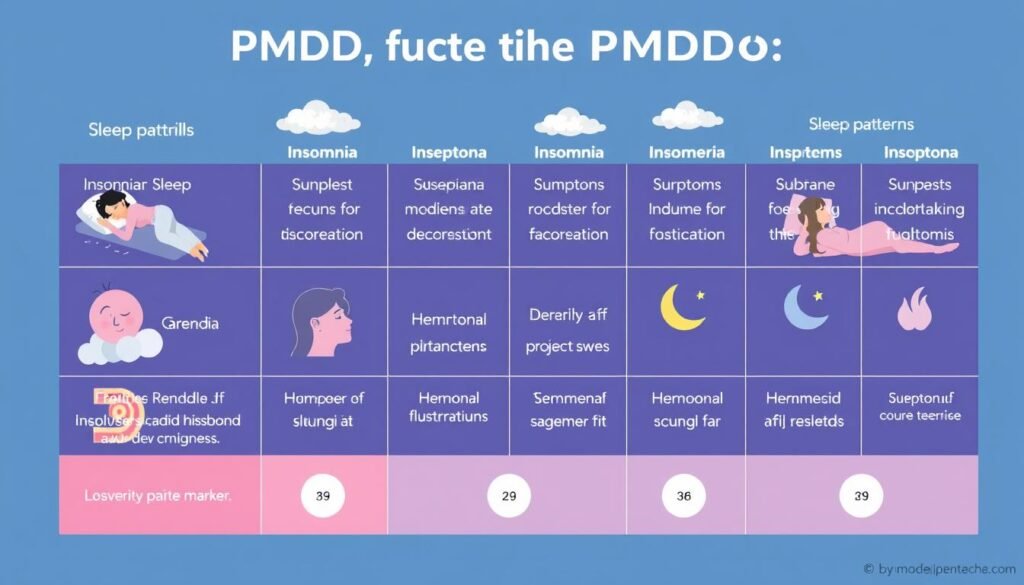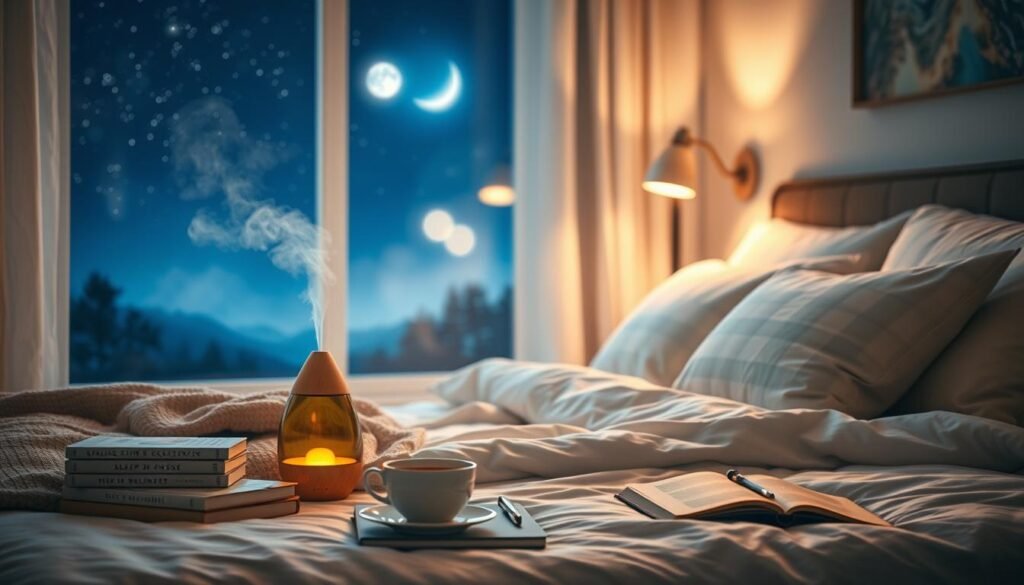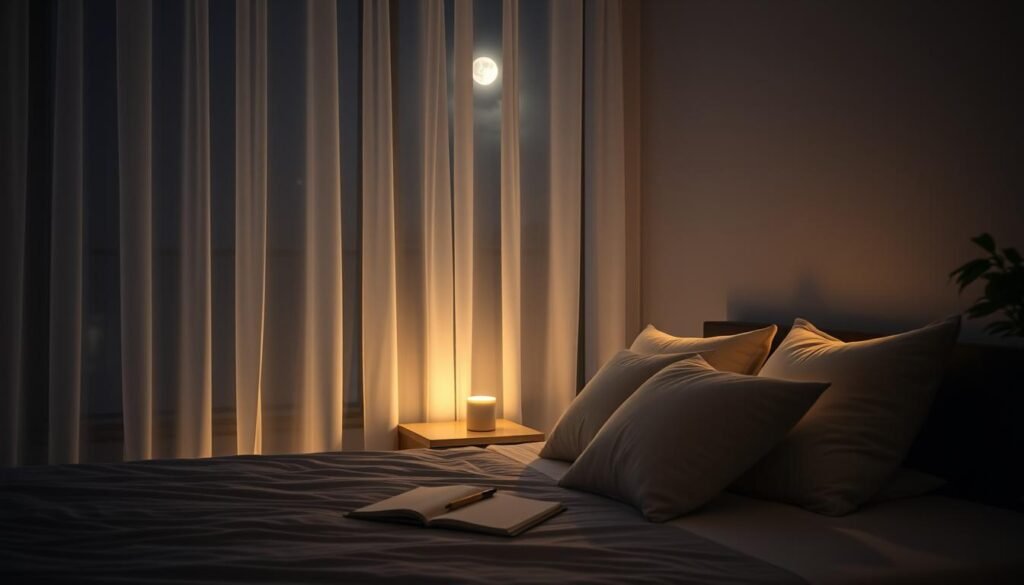Surprisingly, 30% of people have trouble sleeping during their menstrual cycle. About 23% struggle to get a full eight hours of sleep before their period starts. This is known as period insomnia, and it can really affect your mood and health. When your hormones change, your sleep patterns do too. This makes many struggle with sleeplessness when on their period. Studies show that if you have PMS, you’re twice as likely to have trouble sleeping. It’s very important to understand how your menstrual cycle and sleep quality are connected.
Understanding the impact of hormones during your menstrual cycle is key. Hormones like estrogen and progesterone change levels, leading to more wake-ups at night and less time sleeping well. If you’re looking for help, good sleep habits, lifestyle changes, and medical treatments might help. These steps can lead to better sleep during this tough time.
Key Takeaways
- 30% of individuals report disturbed sleep during their menstrual period.
- Hormonal changes significantly impact sleep quality and emotional well-being.
- Those experiencing PMS are twice as likely to suffer from insomnia.
- Maintaining good sleep hygiene is crucial for better sleep during menstruation.
- Implementing lifestyle changes can alleviate some symptoms of period insomnia.
Understanding Period Insomnia
Period insomnia happens when someone has trouble sleeping during their menstrual cycle. It’s quite common and can really impact sleep. About 90% of people with periods deal with premenstrual syndrome (PMS), which often brings sleep problems.
What Is Period Insomnia?
This sleep issue makes it hard to fall asleep or stay asleep during the night. It’s linked to hormonal changes that affect our sleep. If you have premenstrual dysphoric disorder (PMDD), you might notice these sleep troubles even more.
The Role of Hormonal Changes
Changes in hormones like estrogen and progesterone shake up how we sleep. This is particularly true in the second part of the menstrual cycle. Up to 70% of women with PMDD say they have trouble sleeping. Hormonal imbalances could also mean less melatonin, making sleep issues worse.
Those with period insomnia often find it hard to feel rested or alert during the day. They might struggle with how well or how long they sleep. There are ways to help manage these sleep problems, including lifestyle changes, natural remedies, and sometimes medical help.
| Symptom | Description |
|---|---|
| Difficulty Falling Asleep | Trouble initiating sleep, particularly before menstruation. |
| Frequent Awakenings | Waking up multiple times throughout the night. |
| Tiredness During the Day | Feeling fatigued or sleepy even after a full night’s sleep. |
| Low Sleep Quality | Experiencing restlessness and inadequate restorative sleep. |
| Satisfaction of Sleep | Feeling unfulfilled or dissatisfied with sleep. |
The Menstrual Cycle Explained
It’s quite vital to understand the menstrual cycle. It shows us how it changes sleep patterns. It has four main parts: menstruation, the follicular phase, ovulation, and the luteal phase. Each part changes hormones. This can shift our sleep quality.
Phases of the Menstrual Cycle
The cycle kicks off with menstruation. That’s when the uterus lining is shed. Next up is the follicular phase. Here, rising estrogen levels could make our sleep better. Especially around ovulation. After ovulation, it’s time for the luteal phase. Now, progesterone shifts might mess with our sleep before menstruation.
Effects of Each Phase on Sleep
- Menstruation: In this phase, sleep may get better for some. But, pain can spoil sleep for others.
- Follicular Phase: Here, with estrogen on the rise, many might find their sleep quality improves.
- Ovulation: By day 14, high estrogen levels can mean better sleep, easing cycle-related sleep issues.
- Luteal Phase: Entering this phase might make falling and staying asleep harder. This time often sees less sleep quality due to dropping hormones.
Throughout the cycle, many women note sleep changes. Specifically, the luteal phase might bring more insomnia. This includes troubles staying asleep and feeling tired during the day. Recognizing these shifts is key. They significantly impact health and happiness.
Why Hormones Influence Sleep Patterns
Hormones deeply affect our sleep, especially for women during their menstrual cycle. Changes in estrogen and progesterone greatly impact sleep quality. These hormones shape how we experience different sleep stages. By understanding this, we can better address problems like menstrual cycle insomnia and PMS insomnia.
Estrogen and Progesterone Fluctuations
The amounts of estrogen and progesterone change a lot through the menstrual cycle. High progesterone levels before menstruation can make you feel more tired. But when estrogen drops before the period starts, sleeping well can become harder.
This can disturb sleep patterns and raise the risk of insomnia linked to these hormonal changes.
Impact of Hormones on Sleep Architecture
Hormonal changes can really affect how sleep is structured. They can change the amounts of REM sleep and deep sleep you get. The relationship between hormones and sleep affects sleep quality and can intensify PMS insomnia symptoms.
As hormone levels shift, we see how fixing hormonal imbalances might help with sleep issues.
Common Symptoms of Insomnia on My Period
During their menstrual cycle, many experience insomnia symptoms due to hormonal changes. This leads to period sleeplessness for many. Recognizing symptoms is key to managing sleep issues.
Difficulty Falling Asleep
Struggling to fall asleep before their period is common for many. Hormonal shifts and discomfort worsen this problem. Those with sleep quality issues may find their sleep routines are off. They may lay awake longer, growing more frustrated.
Excessive Daytime Sleepiness
Many feel very sleepy during the day while on their period. Poor sleep at night, boosted by hormone changes, makes staying awake hard. They may use caffeine or other energy boosters, affecting their health.
Low Sleep Quality and Restlessness
Low sleep quality, with lots of waking up, is common during the menstrual cycle. This leads to more tiredness and sleep anxiety. Understanding how hormones and insomnia symptoms intersect may help improve this time. For tips on improving sleep quality, visit this resource.
PMS and Its Connection to Insomnia
PMS, or premenstrual syndrome, affects many women. It changes not just how they feel emotionally but also how well they sleep. Around 70% of women see changes in their sleep before their period because of hormone shifts. This can lead to menstrual-related sleep issues like trouble falling asleep or staying asleep.
Symptoms of PMS Affecting Sleep
The symptoms of PMS that can mess with sleep include:
- Irritability
- Anxiety
- Physical discomfort
- Fatigue
Many people with PMS-related insomnia wake up a lot at night. Hormonal changes make about 20%-40% of women more prone to sleep problems.
The Association Between PMS and Sleep Quality
PMS and sleep quality are closely linked. Women are 1.25 times more likely to struggle with sleep than men, mainly due to the menstrual cycle’s hormonal changes. Severe PMS symptoms can also make sleep worse. This is even more evident for those with premenstrual dysphoric disorder (PMDD). PMDD can make anxiety and irritability worse.
Lifestyle changes may improve PMS-related insomnia:
- Increasing physical activity
- Maintaining a balanced diet
- Limiting caffeine and alcohol intake
- Exploring relaxation techniques
These lifestyle tweaks can help better sleep quality and reduce PMS’s effects on daily life.
| Factor | Impact on Sleep |
|---|---|
| Hormonal Fluctuations | Disrupted sleep patterns and increased insomnia |
| PMS Symptoms | Irritability and anxiety affecting the ability to fall asleep |
| Physical Discomfort | Increased restlessness and difficulty maintaining sleep |
| Lifestyle Changes | Improvements in sleep quality with exercise and relaxation |
Understanding Premenstrual Dysphoric Disorder (PMDD)
Premenstrual Dysphoric Disorder (PMDD) is a severe type of Pre-Menstrual Syndrome (PMS). It greatly affects daily life, especially sleep. Hormonal changes play a big role in changing sleep patterns for those with PMDD. Grasping this interaction helps with finding better ways to manage and treat it.
How PMDD Affects Sleep
Severe insomnia is common in people with PMDD. Symptoms usually start a week before menstruation. They include feeling exhausted, depressed, anxious, and having trouble sleeping.
Those with PMDD struggle more with sleep quality and falling asleep than those without it. Fluctuations in melatonin during the luteal phase mix up sleep patterns.
Link Between PMDD Symptoms and Insomnia
PMDD and insomnia are closely linked. About 66% of people with PMDD have sleep issues. This condition often comes with mood problems, like more anxiety and depression. Hormonal shifts and sleep troubles make these symptoms worse. To learn more about PMDD, check out this resource.

| Symptom | Percentage of Affected Individuals |
|---|---|
| Tiredness | 84% |
| Depressed mood | 72.3% |
| Tearfulness | 70.3% |
| Anxiety | 70% |
| Backache | 69% |
| Sleep problems | 66% |
How the Luteal Phase Affects Sleep
The luteal phase is key in messing with sleep for many people. It happens in the second part of the menstrual cycle. This period lasts about two weeks before the period starts. During this time, there’s a big jump in progesterone. This changes body temperature and messes with sleep.
Timing and Symptoms of Sleep Disturbance
About 75% of women may face PMS symptoms, linked to sleep troubles. In the luteal phase, 3-8% might get PMDD, making insomnia more likely. They often feel overly tired during the day, wake up a lot, and don’t sleep well. The spike in progesterone is a big reason for these sleep issues.
The Role of Melatonin in Sleep Regulation
Melatonin is vital for sleep control but drops in the luteal phase for those with PMDD. This fall affects when you fall asleep and how well you sleep. Women have less REM sleep and more deep sleep during this time. This can change memory and mood. Hormone swings and changes in sleep make it hard to get good rest.
Strategies for Better Sleep During Your Period
To get better sleep during your period, practicing good sleep hygiene is key. Making simple changes in your lifestyle can really help you sleep better. Here are some tips to get you started.
Healthy Sleep Hygiene Practices
To sleep well, it helps to have a good sleep routine. Here are some things to try:
- Maintain a Consistent Sleep Schedule: Sleeping and waking up at the same time every day can help set your body’s clock.
- Create a Calming Bedtime Routine: Do relaxing activities before bed like reading or meditation. It tells your body it’s time to slow down.
- Foster a Sleep-Friendly Environment: Make sure your room is dark, quiet, and cool. Most people sleep best in a room that’s between 66 and 70 degrees Fahrenheit.
- Limit Screen Time: Turn off electronics at least an hour before bed. This helps avoid blue light, which can mess with your sleep hormone, melatonin.
Lifestyle Changes You Can Implement
Adding some lifestyle changes can also make sleeping during your period easier:
- Engage in Regular Physical Activity: Exercising regularly can lower stress and anxiety, which might help you sleep better during your period.
- Manage Stress Effectively: Yoga, deep breathing, and mindfulness can help reduce stress. This might make it easier to relax at bedtime.
- Avoid Smoking: Smoking can harm your sleep quality and make insomnia worse during your period.
- Address Nighttime Concerns: Using menstrual products that make you feel secure can reduce worries about leaks. This can help you sleep more soundly.

| Strategy | Potential Benefit |
|---|---|
| Consistent Sleep Schedule | Regulates internal clock |
| Calming Bedtime Routine | Enhances relaxation |
| Optimized Bedroom Temperature | Promotes deep sleep |
| Regular Exercise | Reduces stress and anxiety |
| Mindfulness Techniques | Decreases tension |
Natural Remedies and Treatments for Period Insomnia
Finding effective ways to handle period insomnia can make sleep better during your period. There are many natural solutions that might ease sleeplessness caused by hormone changes. Looking into these can help people manage their own health better.
Herbal Supplements and Sleep Aids
Many people use herbal supplements as natural ways to beat insomnia. Valerian root and chamomile help calm the mind. Supplements like evening primrose oil and St. John’s wort may cut down PMS symptoms for some. Using these aids at night can lead to better sleep. Learning more about these options can help find what works best.
Behavioral Therapies and Relaxation Techniques
Behavioral treatments, like cognitive behavioral therapy for insomnia (CBT-I), give ways to beat bad sleep habits. It’s important to have a calm routine at night. Doing things like meditation, gentle yoga, and staying off screens before bed can help relax. Also, drinking less caffeine might help with sleep issues during hormonal shifts. These strategies and good sleep routines can tackle insomnia well.
| Natural Remedy | Potential Benefit | Application |
|---|---|---|
| Valerian Root | Promotes relaxation and reduces anxiety | As a tea or supplement |
| Chamomile | Helps in falling asleep faster | As herbal tea before bedtime |
| Epsom Salt Bath | Relieves muscle tension and promotes relaxation | Soaking in warm water added with Epsom salts |
| Lavender Essential Oil | Improves sleep quality | Using in aromatherapy or a diffuser |
| CBD | Calms anxiety and improves sleep | As oil or capsule |
When to Seek Professional Help
Knowing when to get help for insomnia during menstrual cycles is key to well-being. If severe insomnia disrupts daily life, it’s time to see a doctor. These severe symptoms include big trouble falling or staying asleep and waking up too early.
This could be due to hormone changes during your cycle, which affect sleep quality.
Recognizing Severe Symptoms
Insomnia should not be a normal part of your menstrual cycle. Watch for severe symptoms like:
- Difficulty falling asleep
- Frequent awakenings during the night
- Persistent daytime sleepiness
- Impact on daily functioning
Women with menstrual issues like PMS or PMDD often have these insomnia symptoms. If you’re sleepless before your period, you might need help.
Potential Treatments from Healthcare Providers
Doctors can create a plan to fix these sleep problems. Here are some options:
| Treatment Type | Description |
|---|---|
| Hormonal Treatments | Changing hormone levels may solve cycle-related insomnia. |
| Medication | Sleep meds can quickly fix severe insomnia symptoms. |
| Therapies | CBT and relaxation methods may ease anxiety causing sleep issues. |
Getting help can make a big difference in your life and help you manage your sleep. Knowing how your cycle affects sleep helps you talk to doctors about the best treatment.

The Intersection of Female Reproductive Health and Sleep
Exploring how female reproductive health and sleep connect is key. Hormonal disorders deeply affect sleep quality over time. These changes can cause sleep issues that many don’t expect.
This leads to myths about sleep problems. Significant hormonal shifts can indeed make good sleep hard. Being aware of these facts is the first step to better sleep.
Long-term Sleep Effects of Hormonal Disorders
Hormonal issues can make sleeping well hard for a long time. Before menopause, up to 46% of people have sleep troubles. This shows how crucial hormonal balance is to sleeping well.
After menopause, sleep problems affect about half of everyone. Anxiety and depression can make these sleep problems worse. They add to the challenge of the menopausal transition.
Discouraging Myths and Misunderstandings
There are many myths about sleep and reproductive health. For example, many don’t see how insomnia during menstruation is tied to hormonal changes. About 5.3% of women face severe premenstrual symptoms, like insomnia. This calls for greater awareness.
Some treatments, like hormone therapy, can help with menopause symptoms. But, treatments don’t always work well for premenstrual dysphoric disorder. Up to 75% of people find that standard treatments aren’t enough. This shows the need for better understanding and solutions.
| Condition | Percentage Affected |
|---|---|
| Sleep difficulties pre-menopause | 46% |
| Sleep disorders post-menopause | 50% |
| Prevalence of sleep apnea | 25% pre-menopause, 33% post-menopause |
| Restless legs syndrome (RLS) post-menopause | More than 50% |
| Sufferers of severe premenstrual syndrome | 5.3% |
Understanding these connections helps people manage symptoms better. Knowing how hormonal disorders affect sleep can improve life quality. It’s all about awareness and finding the right strategies.
Conclusion
Many women struggle with insomnia during their period due to hormonal changes. Knowing how these changes affect sleep is key. This knowledge helps tackle different menstrual-related sleep problems.
Strategies like healthy sleep routines, relaxation techniques, and natural remedies can improve sleep. If young women get less than eight hours of sleep, they may feel more menstrual discomfort. So, making sleep a priority is vital for menstrual health.
To manage period-related insomnia, it’s important to understand how hormones impact sleep. Adopting specific strategies can help. By doing so, women can handle their menstrual cycles better. This leads to better comfort and health overall.